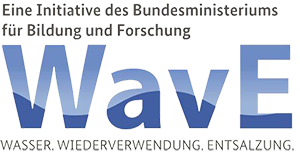On 07.03.2022, the online workshop "Requirements for Selective Desalination in Practice" took place as part of the BMBF-funded innovatION joint project in the funding measure Water Technologies: Reuse, the online workshop "Requirements for Selective Desalination in Practice" took place. After the welcome address by the moderator, Prof. Dr.-Ing. André Lerch from the Chair of Process Engineering in Hydrosystems at TU Dresden, the objectives of the workshop were presented. As a selective desalination plant is being developed within innovatION, further requirements and areas of application in practice as well as further questions regarding selective desalination are to be compiled together within the workshop with the 42 participants from research, industry and politics, which are to receive attention within the research project. Prof. Lerch presented the concept of selective desalination of innovatION: "In conventional desalination processes, polyvalent ions such as calcium and magnesium are removed first, or full desalination is carried out, in which case subsequent mineralisation must be carried out for treatment into drinking water or for use in irrigation. In contrast, monoselective membrane capacitive deionisation (mMCDI) aims to remove only monovalent ions, such as sodium, chloride and nitrate, from saline waters by using selective membranes." At the beginning of the workshop, Dr. Heiko Schwegmann from the project management organisation Karlsruhe and Dr. Christina Jungfer from DECHEMA gave their greetings and pointed out the importance and promotion of desalination for Germany as well as in a global context.
After the introduction, the practical partners of innovatION, Dr. Jan Kolja Hesse from the Oldenburgisch-Ostfriesischer Wasserverband and Joachim Oltmann from the Kreisverband für Wasserwirtschaft Nienburg, demonstrated their need for utilisation-oriented water treatment due to increasing water withdrawals and simultaneously decreasing groundwater quality and quantity. Ron Jong from the KWR Water Research Institute as an associated partner then presented water treatment and desalination concepts in the Netherlands. The subsequent discussion once again showed the national as well as the international need for efficient solutions to remove monovalent ions such as sodium, chloride and nitrate, but also per- and polyfluoroalkyl substances (PFAS) that are difficult to degrade.
In the afternoon of the workshop, discussions were held in smaller groups in three parallel discussion forums on practical applications with Prof. Dr.-Ing. Lerch (TU Dresden, Chair of Process Engineering in Hydrosystems), selective process engineering and materials with Dr. Meier-Haack (Leibniz Institute of Polymer Research Dresden e.V.) and sustainability with Dr. Scope (TU Dresden, Chair of Business Administration, esp. Sustainability Management and Operational Environmental Economics). Like at a round table, the participants from the different areas were able to express their ideas, concerns and questions, which were summarised with the help of a digital pinboard.
Digitally, too, with the support of a sweet motivational package and online communication tools, a joint practical exchange with many participants from different fields on selective desalination could be carried out.
Protocol report on the online workshop "Requirements for selective desalination in practice"
article_from
contact_person_press:
- tud
- Prof. Dr.-Ing. André Lerch
- professorship
- telephone_short: +49 351 463-37537
- email_short: andre.lerch@tu-dresden.de
contact_person_generally:
- tud
- M.Sc. Hanna Rosentreter
- professorship
- telephone_short: +49 351 463-37872
- email_short: hanna.rosentreter@tu-dresden.de



